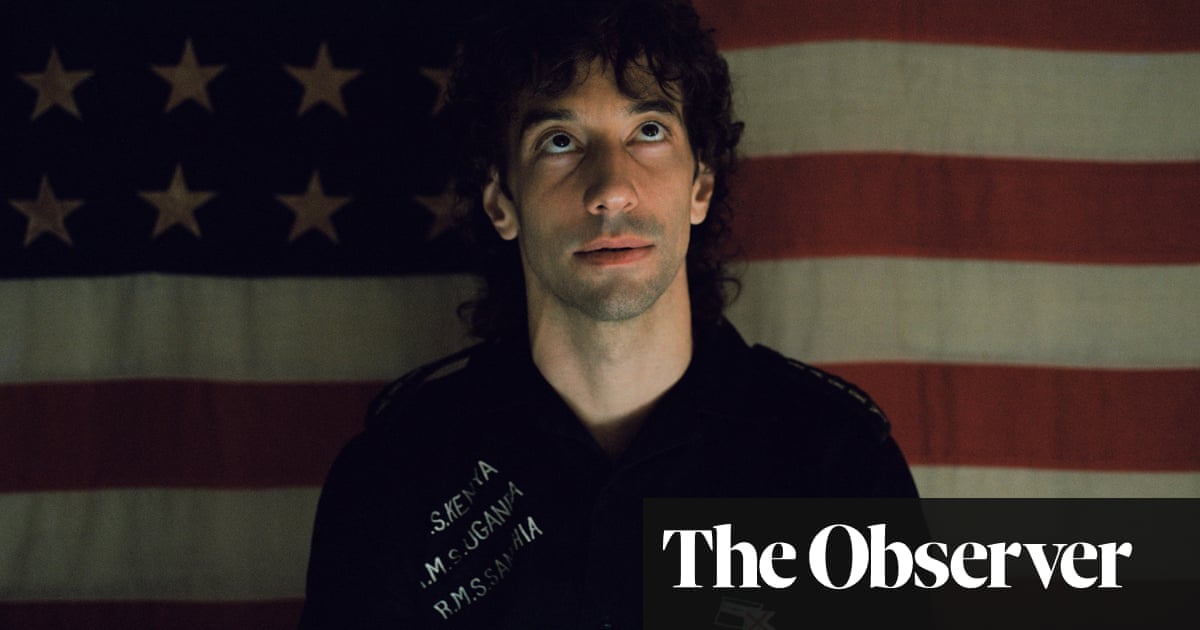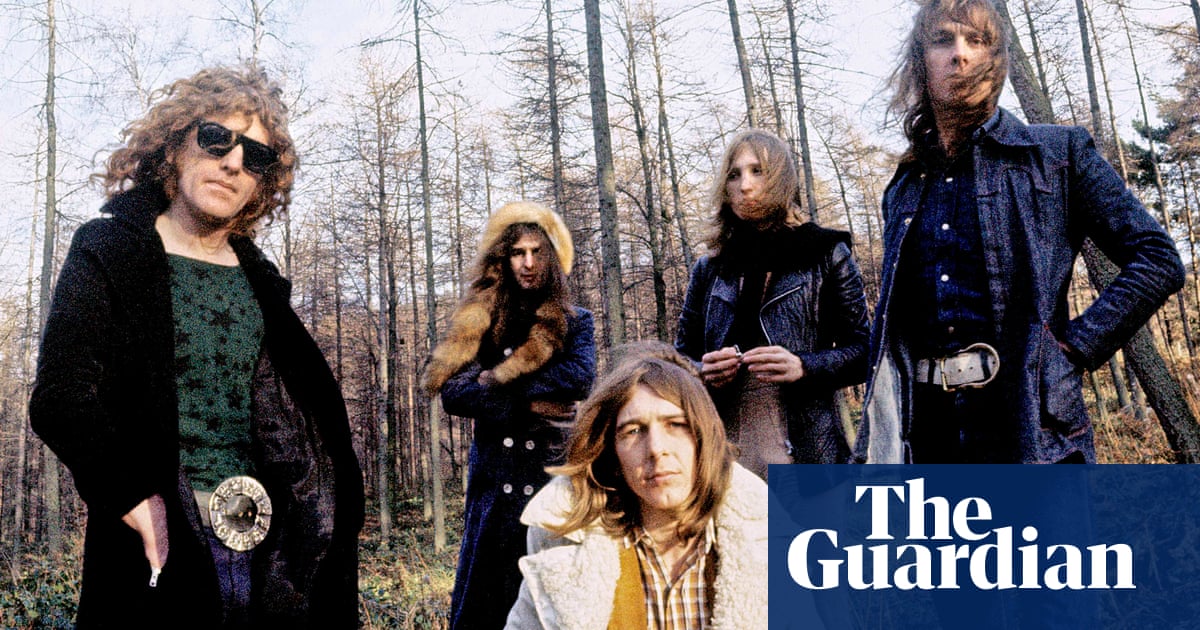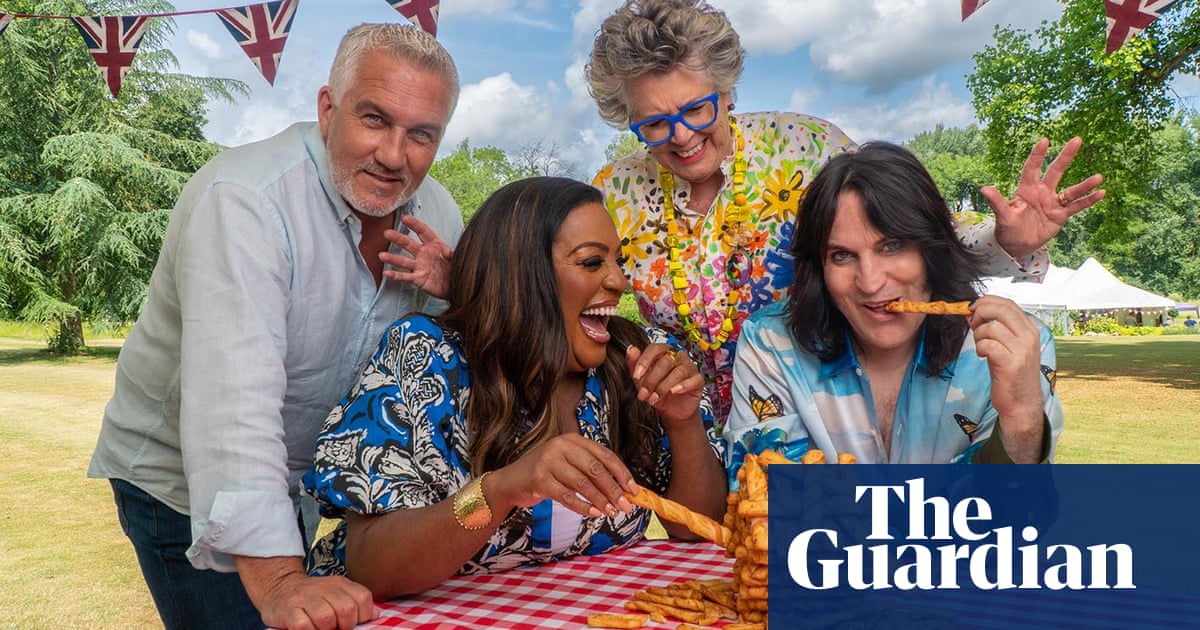
Albert Hammond Jr is standing in his backyard in Los Angeles, talking to me on the phone. “You want the camera on?” he asks. “OK. I don’t like it but let’s do it.” He holds his mobile low, so his face is elongated; his curly hair is wet and shaggy, a hedge-y halo. I watch him move between outside and in (“I need to pace to think”), sunlight flashing. It’s around 9am. Hammond Jr is after some rays, so he keeps lifting his face upwards, exposing his shoulders. Full disclosure – and some readers may need to be sitting down for this – he has his top off.
Given that Hammond Jr, as guitarist for the Strokes, is usually associated with the scuzzy glamour of downtown New York, with a once well-established drug habit and a tight-trousered all-night social life, this west-coast incarnation might come as a shock. But nobody stays the same, despite what fans may wish. And he hasn’t gone bland. At one point, I tease him that his breakfast is very LA (he’s having sweet polenta porridge with almond milk and fresh berries), and he jabs back: “Do you mean LA like it’s awesome, healthy and great?” He can be spiky, when he thinks you’re being obvious. Mostly, though, he’s warm, quite serious. Thoughtful.
We’re talking about his new solo album, Melodies on Hiatus, his fifth, which he started almost immediately after his last, Francis Trouble (2018). That punchy, upbeat album lasted just 36 minutes and was inspired by his twin, who died in a miscarriage before both of them were due to be born. Melodies on Hiatus is much longer, a double album boasting 19 tuneful, varied songs, some with multiple hooks. They take small incidents, seemingly from Hammond Jr’s life, and twist them into offbeat yet universal vignettes. There’s a vague arc, from bachelor life to fatherhood to something more awe-inspiring, but it’s not specific.
Hammond Jr himself is determinedly nonspecific. He’s a good talker, but doesn’t want to give too much away. To be honest, he says, music, rather than words, is his thing. He hears music in his head all the time. “Melodies are what turn me on,” he says. “And for me, music is just constant. I’m always writing, it doesn’t stop. Little voice memos, I’ll pick up the guitar… It’s all fragments. I even hear music like that, in fragments. Sometimes I can’t do too long of a melody line, because my brain just can’t hear it.” He can find it hard to focus and connect everything up, so his songs can take some time.
Also, when it comes to lyrics, he can come unstuck: “I don’t always hear the words in a song.” So, this time round, he worked with Canadian singer-songwriter and poet Simon Wilcox (despite the name, she’s a woman) in order to find the words. Introduced, during Covid, by a mutual friend, he sent Wilcox a folder of about 30 songs, fully fleshed out, except for the words. They didn’t meet in person, but spoke for long hours on the phone, about their lives, “the shadows and the shame”. It was a profound experience for him. “To be open like that and be that vulnerable with someone – look, it’s made me cry! It’s not to do with the record,” he says, his eyes welling, “it’s just powerful to have that experience with another human being.”
After each conversation, Wilcox would go away, write lyrics on her typewriter, put them in an envelope, drive over to where Hammond Jr was living and post them into his letterbox. Just one version, no copies. A precious thing. And what she did, says Hammond Jr, is, strangely, make the lyrics sound more “him”. They are very conversational. Wilcox would take something he said to her, just in passing, and use it to make a lyric. She had his music, and kept his phrasing.
The results surprised him: “Sometimes it was like she was sending me messages.” I think of the gorgeous Dead Air: “Thought I had to be somewhere, over here or over there… Calm my nerves: in the morning, wake up and put on some shirt, even though I’ve got nowhere to go….” Casual, but pointed.
Later, I talk to Wilcox on the phone. She is delightful: I can imagine that having a long conversation with her would be easy. She describes her phone talks with Hammond Jr as deeply intimate, but also almost “imaginary”, and afterwards, the words flew out of her hands on to the paper, “they wanted to go into that weird mailbox”. It was she who suggested that they didn’t meet, though they have now, “and he felt like an old friend”. She’s had mental health issues in the past, “and if you could have told me when I was 15, or when I was in a psychiatric hospital in Ottawa, dreaming of what life could be, that I would have this profound experience with the coolest guy in the coolest band…”
She catches herself: “Oh, the other guys are cool too!”
But I agree with her: in an exceptionally cool band, Albert Hammond Jr was the coolest. He was invited to join the Strokes in 1998, when he bumped into his old school friend Julian Casablancas, who was with Nikolai Fraiture, on the street in New York. From the start he knew they were on to something.
“Yeah, I knew very quickly,” he says. “There was something very special about all of us together, even early on. The universe moved when we were all together in a certain way. Like a Rubik’s Cube that gets unlocked. You either find it or you don’t. I always felt that was unique.”
The Strokes burst into the world in 2001, with their first album, Is This It. One of those rare bands that turn up fully formed: perfect look, perfect sound, one-two-three-four-five of them, pick whichever you want, they’re all brilliant. The best bands are a gang that immediately change music – make it swerve into a new lane – from the moment they arrive, and the Strokes were that. But they were so good that they seemed to eclipse themselves before they knew what they were doing. The shadow of their debut, of that time, falls forward, not back. “Yeah, it’s a little boring. Like I feel new and exciting now. Maybe if I was lying in bed dying, I could reminisce about these brothers in arms that I’ve had for 25 years…”
And actually, he says: “I feel like I’m in a bigger band now than I did when we were younger and everyone said we were in a big band. It still felt pretty underground back then.” Many fans have arrived in the years since that initial burst, who’ve locked on to the Strokes’ newer albums. Recently, the band has been supporting the Red Hot Chili Peppers – proper stadium gigs – and Hammond Jr has enjoyed it. The joy of performing, he thinks, is not in the good moments when everyone in the band gets in deep and gets it right – “you always try to do that” – but in playing for the audience’s reaction. “You’re seeing how they’re reacting, this room full of other people who have lived their lives and had experience with your music. And that’s what turns you on.” It happens more with the newer songs, he thinks.
But this contemporary, mutual, only-in-the-moment joy is not what outsiders want from Hammond Jr, or any member of the Strokes, it seems. They want the past. There has already been an excellent book about that time, Meet Me in the Bathroom, Lizzy Goodman’s oral history of early 2000s New York bands, and now, there’s a film with the same name (not so good). “It seems so close,” says Hammond Jr. “I’m 43. Can’t they wait until I’m 63?” Though the Strokes feature in the documentary, in archive clips, they didn’t cooperate with the film-makers, or agree to be interviewed. He hasn’t seen it, and doesn’t agree with the idea that the Strokes formed a scene. “I didn’t feel part of a scene. We always felt like an island trying to do stuff for ourselves,” he says. “It’s also small moments of life, edited into how someone wants to tell a story. Life is so much more fun and complicated than that.”
His life, recently, has been complicated, if not always fun. While making Melodies on Hiatus, his parents, Albert Hammond and Claudia Fernandez, a composer and an ex-model, were divorcing; he and his wife, Justyna, were moving to LA, renting different places; then Covid happened; and they had a baby. Their daughter, now two, is called Holiday, and Hammond Jr is enjoying being a parent, though he describes it as “a complete destruction”. “People say: ‘Oh I was at the hospital and I realised my life had changed,’” he says, mock serenely. “I’m like, ‘Bullshit’. Having a child breaks down everything possible, and you have to rebuild it. You have to redo your whole life. It’s insane.”
He enjoys cooking dinner for Holiday, putting her to bed, “watching her personality grow”. She has a scooter and he likes going around the street together. “It’s fun to do those moments, and then it’s hard when she’s dealing with emotions and life, and growing… I like to know that she will be in this world when I am not. It excites me.” He has a picture of him holding her in the studio. He thinks Justyna has it tougher than him.
Hammond Jr, like many sober former drug users – “I’m not completely sober, I sometimes have a glass of wine” – is lovely company, self-reflective and funny. Still, he’s clearly not entirely comfortable, even when talking about his album. Why?
“Oh, I’ve been doing this [interviews] for 20 years,” he says. “And I just feel like I’m constantly never achieving what I want to achieve, and I overthink everything and end up hating myself. You know, when I was making the album, I was like chasing dreams, getting lost into things that were exciting, I felt like a child… And now I hate myself because I’m trying to describe it, and it’s just like… Music isn’t tangible. When I read interviews, I see what I’m trying to articulate. I think so deeply about it, and someone underneath will just write: ‘Huh, his new song sounds like a Strokes song’. Well… yeah!”
People tag him on Instagram, he says, and they say they’re going to kill him because they don’t like a new track, because it doesn’t do what they want it to do. Which is either sound like the Strokes, or not sound like the Strokes.
“I mean, I get that people want me to talk about the past. People want the war stories. People want to live a life that they didn’t get to live.”
He holds the phone up to his mouth, addresses someone out there.
“So yes, random stranger in the world, I had more fun than you did,” he says. “But it was just my life.”












